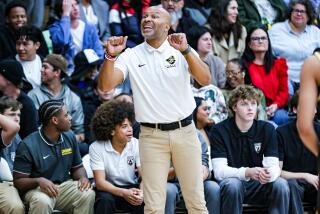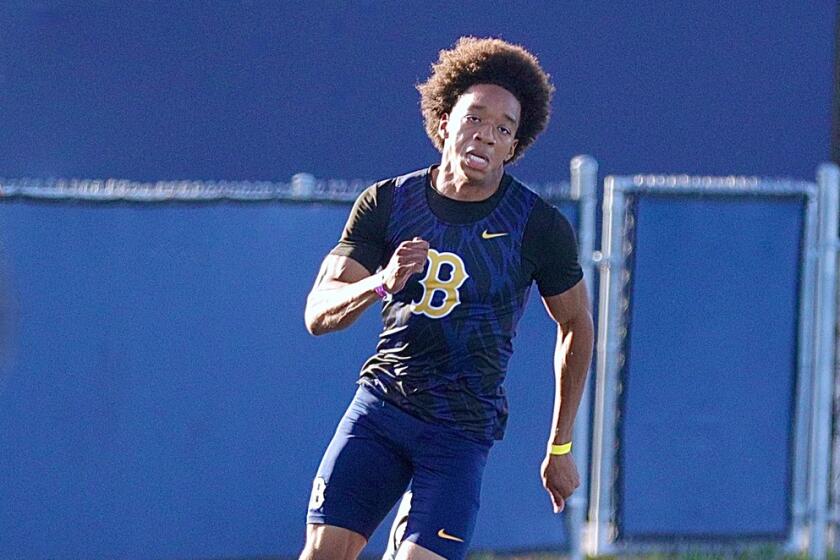Q & A WITH JOHN PONT
- Share via
HAMILTON, Ohio — John Pont was 39 when he coached Indiana into the Rose Bowl in 1968 before moving along to Northwestern and then to a business career at Oxford, Ohio.
Eighteen years later, at 57, Pont has made another adjustment. He is back in football as the coach of a high school team in this river city of 60,000.
A boy wonder, Pont at 28 had been the head coach of a college team. This is his first high school position, and he says he loves it.
Question: But isn’t this a move in the wrong direction?
Answer: Not for me. I get the same kick out of high school coaching that I had on the college level.
Q: How do you explain it?
A: I guess I’m like a guy who gets charged up by train whistles. To me, the greatest sound in the world is the whistle that starts a football game in which I’m involved.
Q: High school coaching, however, is different. A prep coach often has to pitch in as a teacher.
A: I do--every day. And I like teaching--always have. I like making an impact on another person’s life. Watching them develop. At Hamilton High School, I have two periods a day in the Occupational Work Experience study program--a program for students who fall a year or two behind. And, later, I’ll be involved in track and field.
Q: As the head coach?
A: No, no. My assistant on the football team is my boss in the spring. He’s the head track coach, I’m the assistant.
Q: You were out of sports for five years after your final season at Northwestern University. Why did you come back?
A: These people asked me back, and after thinking it over awhile, I came. My home in Oxford is only 15 minutes from the Hamilton field. One day a Hamilton friend of mine, an M.D. I’d gone to school with at Miami (University, Ohio), called to say that his superintendent of schools had asked him to ask me. That’s how it started.
Q: What did you tell him?
A: I said I’d made a gratifying adjustment to a business career (marketing, insurance, investments, etc.).
Q: Did they twist your arm?
A: No, I gave it some more thought. And I realized I’d already proved what I’d started out to prove (in business)--that I could do something besides coach football. But I also realized that I wasn’t having the same job satisfaction I’d had in football. At that point, I was only concerned about one thing.
Q: What was that?
A: I wanted to be sure that the Hamilton people would commit to a successful program. As soon as I was convinced that they and I were interested in the same kind of success, I accepted.
Q: You accepted a job on a team that plays in probably the toughest prep conference in the state. A lot of Ohio writers say it is. How are you going to beat such (Greater Miami Conference) powers as Princeton and Middletown?
A: I’m confident that the football program we’ve started here will make us competitive with them and the others (Lima, Lakota, Fairfield) within two or three years. . . . But in the preps, any football program that’s well organized and well run can soon make itself competitive with any other team from any other school district of the same size. That’s the key--a school district of comparable size.
Q: Why?
A: Because high school teams don’t recruit players. They grow them. It’s different on the college level. In the Big Ten, if Michigan and Northwestern are recruiting the same kid, Michigan gets him, 9 out of 10 times. In high school, though, we don’t have to worry about Princeton out-recruiting us. If we do our own job right at Hamilton, we can catch them.
Q: Specifically, what has to be done?
A: You approach it on several levels. To begin with, you have to get all the (junior high) football teams in the school district on the same page. Then you put in a comprehensive weight program and do a number of essential little things. For example, you help the players open savings accounts. . . . You need a positive pre-game meal environment--and so on. . . . At the same time, you must get the enthusiastic support of the community. You’ve also got to have total school support--and those things don’t just happen. The football coach has to make it all happen.
Q: How does it help if the high school coach controls the junior high teams in his area?
A: When the basics are taught in junior high--I mean such things as terminology and play assignments--you can take the players to step two quicker in high school.
Q: What’s step two?
A: Developing their skills.
Q: Why should prep students lift weights? Isn’t high school a little early for that?
Q: My reason for a weight program is to improve the individual’s self-image.
It takes self-discipline to improve the body. Just having to attend regularly is very important to a young, developing person. Just keeping (weight) records helps. You can’t cheat on weights.
Q: What business is it of a football coach whether his players have savings accounts?
A: The school buys the (football) uniforms. Each player is responsible for buying his own shoes, socks, shorts and jock straps. If they have savings accounts, they can pool their money and all buy the same clothes. Football players take more pride in themselves and their team if they’re dressed absolutely alike.
Q: A moment ago you mentioned pregame meals. These were standard at Indiana and Northwestern in your time--but isn’t high school a little early for that much regimentation?
A: Well, Friday night is game night (at 7:30) in high school. But school is out as usual at 2:30 p.m. If you don’t have something organized, you don’t know who your players are talking to all that time, you don’t know what they’re doing, you don’t know what they’re eating--if anything.
(So) on game days, Fridays, our coaches and players all get on a bus and take a 15-minute ride to a YMCA camp near town. Out there we show highlight films of (pro and college) football games and have a leisurely dinner. All coaches and players serve as waiters, and also on the cleanup detail--a different group each week. I think it’s an educational experience.
Q: Looking back on these last several months in high school coaching after many years as a college coach, what are the major differences?
A: I’ve only found one real difference. You have to exercise more patience in high school--a lot more. Everything else seems the same to me. My practice schedule is the same. I teach the same things. There are as many demands on a coach here as there are on the college level. The strategy of the game is the same. But if you don’t have the patience of Job, you can’t make it as a high school coach.
Q: What you’re saying is that it’s the players that are different.
A: Are they ever. The thing that surprised me is how animated high school players are. They’re all yak artists--chattering all the time. You have to stand there and say “Let’s have some quiet” three or four or five times to get it. In college, once was enough--if you even had to say it once.
Q: The short motor trips in the Hamilton area must appeal to you--15 minutes from dinner to the game, 15 minutes home.
A: I might not have come back to coaching if my home were an hour away. Every place we’ve lived--Yale, Indiana, Oxford (Ohio)--my wife Sandy and I have built our own house. And we’ve got just what we want here.
Q: What do you like about it?
A: The kitchen. Our name for this is the Great Room--the kitchen, living room, dining room and family room all in one big room. The conversation piece is the five-foot-square cooking island in the middle where Sandy and I cook at the same time. She works on one side while I work the other. I have more cook books than football books.
Q: What’s your specialty?
A: I love Spanish dishes, particularly one called paella. I’m Spanish, you know--my father was born in Spain. Their paella is the Spanish equivalent of Irish stew. Our (three) children seem to like it, too.
Q: What do you think of the Big Ten since your time?
A: The new rules and new coaches have made it more competitive. It isn’t a Big Two (Michigan and Ohio State) anymore because some of the new coaches have won enough games to get their programs established. Illinois may be on probation this year--but they’ve established their program.
Q: If you were to live your life over, would you like the same script--a college head coach in your 20s, a high school coach three decades later?
A: If I could do it again, I’d only change two things. When the (Pittsburgh Steeler) Rooneys showed an interest in me (before hiring Chuck Noll) I told them many thanks but said I loved Indiana. This was just before the Vietnam campus revolutions and the black revolutions and the other student unrest. If I could make that choice again, I wouldn’t be so hasty.
Q: What else would you change?
A: I wouldn’t leave Yale after serving only two years of a five-year contract. They respected my wishes and didn’t stop me from going--but I had given my word. We ask our players to commit themselves. Coaches should, too. I’ll regret breaking my word to Yale till the end of my life.
Q: No regrets at Hamilton?
A: I only wish we could win them all.
More to Read
Get our high school sports newsletter
Prep Rally is devoted to the SoCal high school sports experience, bringing you scores, stories and a behind-the-scenes look at what makes prep sports so popular.
You may occasionally receive promotional content from the Los Angeles Times.





